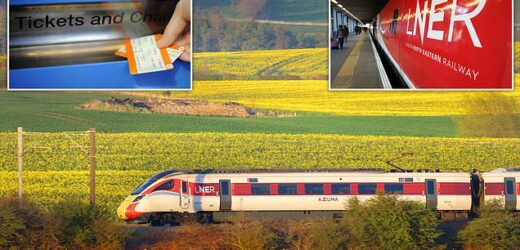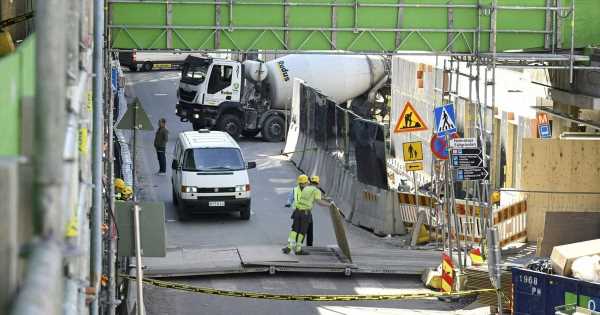LNER scraps return tickets in bid to simplify rail fares – here’s how you can save money on train journeys
- LNER will expand trial of single leg pricing to cover entire network from Sunday
- Single fares across London-Edinburgh route will be around half price of return
Return fares will be scrapped on most LNER train services under a major shake-up of the ticketing system which could be extended to other parts of the rail network.
London North Eastern Railway said it will expand an existing trial of single leg pricing to cover its entire network from Sunday, running from King’s Cross to Edinburgh.
That means single fares across the operator’s full East Coast Main Line route will be around half the price of a return, giving passengers more flexible ticketing options.
Passengers can now try to get better value by mix and matching different types of single tickets – those being the anytime, off-peak or super off-peak or advance singles. The scrapped tickets are the anytime, super off-peak and off-peak returns.
Britain’s outdated train tickets system means many return fares are only £1 more than single fares. That means passengers often cannot save money if cheaper advance tickets for specific services are only available for one direction of a return journey.
LNER calls at more than 50 railway stations along the East Coast route, totalling 956 miles
LNER began trialling single leg pricing in 2020 between London King’s Cross and Leeds, Newcastle and Edinburgh.
Five top tips for saving money on rail travel
RAILCARDS
Most railcards cost £30 for a year and cut a third off the price of off-peak travel, with a variety available for different age groups such as the 16-25 Railcard, 26-30 Railcard and the Senior Railcard for over-60s.
Two people travelling together can also get a Two-Together Railcard, while up to four adults travelling with up to four children can use a Family & Friends Railcard. There are railcards for the Armed Forces, veterans and the disabled. Anyone not within those groups could also buy a Network Railcard for travel in the South East.
Those with a 16-25, 26-30, Senior, HM Forces, Disabled Persons or Veterans Railcard can also load the discount onto an registered Oyster card for a third off off-peak travel on Transport for London services.
BOOKING IN ADVANCE
It is normally much cheaper to book rail travel in advance, with tickets normally released up to 12 weeks in advance. The Trainline website will even notify you when tickets become available if you sign up to an alert.
Advance tickets are non-refundable, so are not the best option if your plans might change – especially if they are only slightly cheaper than a flexible ticket such as an off-peak return.
TICKET SPLITTING
Sometimes it can be cheaper to buy two or three tickets for the same journey while staying on the same train, which is often because different train operators set fares for different sections of the same route.
This tactic is perfectly legal but can often require plenty of research to get right. Some websites such as TrainPal and Split My Fare offer the tool, but you can sometimes get even better results by trying to do it yourself.
TAKING SLOWER SERVICES
Some lines such as London Euston to Crewe or London King’s Cross to Peterborough have different services run by different operators on the same route – and there is value to be found if you are happy to take a longer journey.
For example, on the Crewe line, it is much cheaper to travel with London Northwestern Railway than Avanti West Coast; while on the Peterborough line, it is cheaper to go with Great Northern or Thameslink than LNER.
CONSIDER TAKING THE COACH
It can be much cheaper to take the coach than the train – and the time difference is not as big as you might imagine for some routes, such as from London to Bristol – which is 2 hours 30 minutes from Hammersmith by National Express coach. This is normally a fraction of the price of a Great Western Railway train which is 1 hour 30 minutes from Paddington.
At the time a ticket bought at the station from London to Edinburgh cost £146.40 for a super off-peak single or £147.40 for a super off-peak return. But under single leg pricing, the cost of a single fell to £73.70.
But it will now be available across its network for tickets bought from Sunday for travel from June 11.
All but a handful of LNER tickets will now be singles under the new expanded single leg pricing approach, with only a few anomalies which will also become single fares in due course.
There will be so few returns left that they would only make up a minute proportion of the tickets available from Sunday.
LNER managing director David Horne said today: ‘The expansion of single leg pricing will mean almost all of our customers will benefit from simpler fares and have the power to mix and match to get the best value fares.
‘We believe that making fares simpler, smarter and fairer will encourage more people to choose rail, making a green and sustainable travel choice.
‘Alongside our successful innovations from our legendary customer service to our industry leading digital products, LNER remains at the forefront of transforming rail.’
Transport Secretary Mark Harper said: ‘The expansion of single leg pricing on LNER is the latest example of this Government getting on and delivering tangible reforms that will benefit rail passengers, delivering simpler, more flexible tickets that are better value.
‘Passengers will get the best value ticket for their journey safe in the knowledge a single ticket will be around half the price of a return.’
Andy Bagnall, chief executive of industry body Rail Partners, called for the trial to be extended beyond LNER.
He said: ‘It is great news for customers that LNER’s trial of single leg-pricing is expanding. The industry has been calling for this important step in simplifying fares for many years.
‘We’d like to see people travelling across the whole network benefit from fares and ticketing reform. Other operators need to be rapidly afforded similar opportunities to trial this type of change.’
LNER said it had commissioned independent online consumer research that found 61 per cent of customers were in favour of the single leg ticketing trial being extended.
The study also revealed that nearly 45 per cent of non-customers were more likely to travel for long-distance journeys with LNER in the future as a result of single leg ticketing.
Mr Harper revealed in February that LNER would trial a system through which fares on some services will fluctuate depending on demand.
He also said at the time: ‘After LNER’s successful single leg pricing trial, we’ll extend it to other parts of the LNER network from the spring and then carefully consider the results of those before extending more widely.
‘This is not about increasing fares. I want passengers to benefit from simpler ticketing that meets their needs.’
The fluctuating structure would make the cost of travel on some LNER services be more or less expensive depending on how many seats have been filled, it was revealed, in an attempt to better manage capacity while also raising revenue.
LNER calls at more than 50 stations along the East Coast route, totalling 956 miles including major towns and cities between London and Scotland.
But the operator will be hit by strike action tomorrow and on Saturday, with a limited timetable operating and only between King’s Cross and both Edinburgh and Leeds.
The Department for Transport took over control of LNER’s operations in June 2018 following the failure of the Virgin Trains East Coast franchise.
The Department for Transport took over control of LNER’s operations in June 2018
It comes as the Government announced today that train services run by TransPennine Express would also be nationalised after months of delays and cancellations.
READ MORE Rail strike map, dates and services: How is YOUR train journey affected by the May 2023 walkout?
Mr Harper announced the decision to bring the operator’s services under Government control, but warned it is ‘not a silver bullet’.
TransPennine Express, which covers an area across northern England and into Scotland, has been badly affected by drivers who are members of the Aslef union no longer volunteering to work paid overtime shifts.
Its services will be brought under its Operator of Last Resort from May 28.
This will bring the proportion of journeys on Britain’s railways which are on nationalised services to around a quarter.
The Operator of Last Resort already runs LNER, Northern and Southeastern services, while ScotRail and Transport for Wales are run by the Scottish and Welsh Governments respectively.
England’s regulated fares, which include season tickets on most commuter journeys, some off-peak return tickets on long-distance journeys and flexible tickets for travel around major cities, increased by up to 5.9 per cent from March 5.
Other operators are also trying new ticket structures in as the rail sector struggles to bring passenger numbers back to pre-pandemic levels.
Since March, Avanti West Coast has been offering cheaper fares on certain routes to people who can be more flexible with their journey times.
Britain’s outdated train tickets system means many return fares are only £1 more than singles
Its Superfare scheme involves customers buying a ticket for a particular date and specifying they want to travel in the morning, afternoon or evening.
READ MORE TransPennine Express train services will be brought under Government control due to ‘continuous cancellations’, Transport Secretary reveals
Around 24 hours before their journey, Avanti West Coast will match ticket-holders to a quieter service and inform them of their departure time.
Tickets are available for single journeys between London and Birmingham, Liverpool, Manchester and Preston. The initiative is being trialled until the end of July.
In February, Britain’s biggest train company Govia Thameslink Railway said it was offering cheaper tickets to encourage more commuters to return to offices on Mondays and Fridays.
GTR said started selling advance tickets for travel on some of its Southern services during the morning and evening peak periods on those days, saving passengers up to 15 per cent.
It comes after the pandemic led to a major change in travel patterns, with many commuters only heading into offices on Tuesdays, Wednesdays and Thursdays.
GTR said at the time that its morning peak services only carry around 210,000 passengers on Mondays, compared with between 230,000 and 250,000 on each of the middle three days of the working week.
On Fridays – which were a quieter day even before the pandemic – the figure drops to around 160,000.
Advance tickets – which are cheaper than walk-up fares – had previously only been available for off-peak services to cater for leisure passengers.
Source: Read Full Article







